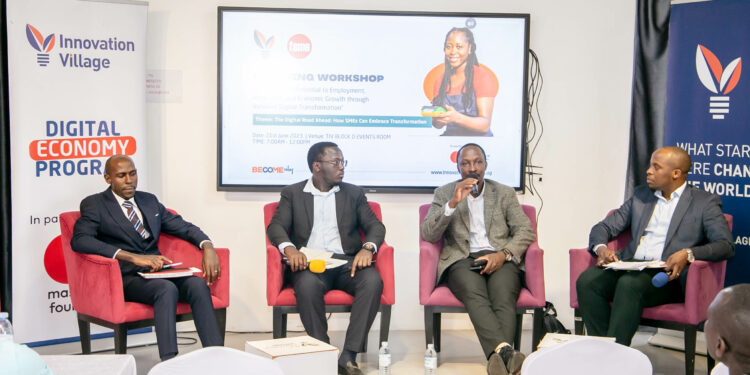The Innovation Village (TIV) in partnership with the Federation of Small and Medium-sized Enterprises of Uganda on Wednesday (FSMEU) hosted a dialogue focused on unlocking the potential of the digital economy for SMEs in Uganda.
The event held at The Innovation Village in Kampala ran under the theme: “The digital road ahead: How SMEs can embrace digital transformation’ focused on actionable insights and policy recommendations to foster inclusive growth and prosperity through leveraging the new digital edge. The workshop highlighted the challenges faced by SMEs in Uganda, emphasizing the possible solutions available through technology in addressing the gaps in employment and innovation, which should foster economic growth.
While speaking at the dialogue, Saul Weikama the Digital Economy Practice Lead at Innovation Village noted that the SME sector among others, face significant challenges in accessing finance, markets, and technology.
“By leveraging digital transformation, we can bridge these gaps and create an enabling environment for SMEs to thrive,” he said.
He said TIV partnered with the Federation of Small and Medium-sized Enterprises of Uganda to contribute to bridging some of these gaps for enterprises.
“Through our Digital Economy Program at The Village implemented in partnership with Mastercard Foundation, we are providing a blend of digital infrastructure, tools, skilling and channels to support those innovating to bring opportunities to the last mile user including young people, women, the agriculture sector and small businesses among others,” he added.
While making the keynote speech on behalf of the Commissioner for Ministry of Trade, Industry and Co-operatives, Mr. Stephen Mbogo Kirya, the Assistant Commissioner, said the significance of digital transformation in employment generation, innovation, and economic growth cannot be overstated. He said, embracing digitalization has become an imperative for SMEs to stay competitive, adapt to changing market dynamics, and unlock their true potential.
“Digital technologies offer SMEs opportunities to streamline processes, access new markets, improve efficiency, and enhance customer experiences. By harnessing the power of digital transformation, SMEs can leapfrog traditional barriers and become key drivers of inclusive economic growth,” he said.
He added that; In Uganda, we have witnessed remarkable progress in digital transformation, but there is still much work to be done.
“Our vision should be to empower SMEs to fully embrace this digital revolution and become active participants in the digital economy. We must ensure that digital skilling initiatives reach the last mile, equipping entrepreneurs and business owners with the necessary knowledge and skills to leverage technology effectively. By fostering an environment that supports tech entrepreneurs, encouraging collaboration, and promoting digital literacy, we can enable SMEs to seize the opportunities offered by the digital road ahead,” he added.
He concluded on behalf of the Ministry by committing to creating a conducive environment for digital innovation and entrepreneurship in Uganda.
John Walugembe, Executive Director of the Federation of Small and Medium-sized Enterprises of Uganda (FSMEU), commented on the importance of embracing the new digital era but with consideration for affordability and resourceful infrastructure. He said, “Our collaboration with the Innovation Village aims to address the urgent need for digitalization of SMEs and enable them to build resilience and grow their businesses. By promoting digital literacy and participation in the digital economy while addressing the gaps, we can foster financial inclusion, business growth, and job creation in Uganda.”
According to recent statistics, MSMEs account for 90 percent of the business sector in Uganda and 75percent of private sector employment, yet only 16 percent have access to formal finance. This lack of resources, compounded by the effects from the COVID-19 pandemic, necessitates innovative solutions to support and empower SMEs.
A recent survey conducted by FSME among the SMEs on the constraints of digital transformation revealed that most businesses do not consider digitalization a priority. They highlighted that devices pose challenges for operation, data and internet costs remain high and the regulatory landscape remains a stumbling block for many citing the high taxation landscape as one of them.
The workshop focused on various themes, including policy and advocacy frameworks for digital solutions uptake to harness digitalization for financial and market growth. Panel discussions brought together stakeholders from government agencies, industry associations, academia, financial institutions, and SMEs to facilitate cross-sector collaboration and the creation of an enabling ecosystem for digital transformation.
Do you have a story in your community or an opinion to share with us: Email us at editorial@watchdoguganda.com













